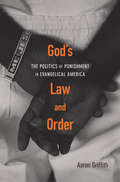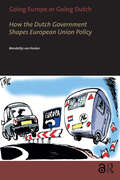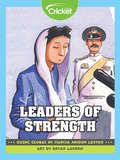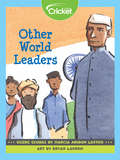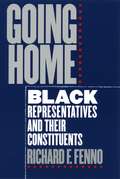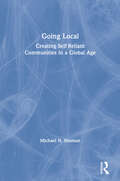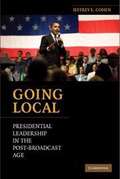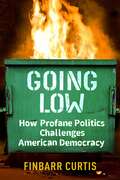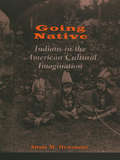- Table View
- List View
God’s Law and Order: The Politics Of Punishment In Evangelical America
by Aaron GriffithAn incisive look at how evangelical Christians shaped—and were shaped by—the American criminal justice system.America incarcerates on a massive scale. Despite recent reforms, the United States locks up large numbers of people—disproportionately poor and nonwhite—for long periods and offers little opportunity for restoration. Aaron Griffith reveals a key component in the origins of American mass incarceration: evangelical Christianity.Evangelicals in the postwar era made crime concern a major religious issue and found new platforms for shaping public life through punitive politics. Religious leaders like Billy Graham and David Wilkerson mobilized fears of lawbreaking and concern for offenders to sharpen appeals for Christian conversion, setting the stage for evangelicals who began advocating tough-on-crime politics in the 1960s. Building on religious campaigns for public safety earlier in the twentieth century, some preachers and politicians pushed for “law and order,” urging support for harsh sentences and expanded policing. Other evangelicals saw crime as a missionary opportunity, launching innovative ministries that reshaped the practice of religion in prisons. From the 1980s on, evangelicals were instrumental in popularizing criminal justice reform, making it a central cause in the compassionate conservative movement. At every stage in their work, evangelicals framed their efforts as colorblind, which only masked racial inequality in incarceration and delayed real change.Today evangelicals play an ambiguous role in reform, pressing for reduced imprisonment while backing law-and-order politicians. God’s Law and Order shows that we cannot understand the criminal justice system without accounting for evangelicalism’s impact on its historical development.
God’s Province: Evangelical Christianity, Political Thought, and Conservatism in Alberta
by Clark BanackA groundbreaking exploration of the religious roots of Alberta conservatism.
Going Around: Selected Journalism
by Murray KemptonA definitive collection of writings by the legendary Pulitzer Prize-winning reporter Murray Kempton (1917-1997) with a foreword by Darryl Pinckney, gathering dozens of columns, essays, and critiques from publications including The New York Post, The New York Review of Books, The New Republic, and Newsday.With many uncollected and long out-of-print writings, this is the first volume of Kempton&’s work to appear in 30 years, a book that resdiscovers the legendary figure of journalism that David Remnick called &“the greatest newspaperman in town.&”&“The man is a marvel. It&’s like listening to Louis Armstrong, or Roy Eldridge: you don&’t know where the hell he is going, but somehow he gets there and it knocks your socks off.&” —Frank SinatraA courtly man of Southern roots, Murray Kempton worked as a labor reporter for the New York Post, won a Pulitzer Prize while at Newsday, and was arrested at the Democratic National Convention in Chicago along the way. He wore three piece suits and polished oxfords and was known for riding his bicycle around New York City while listening to his CD Walkman and smoking a pipe with wild red hair that later turned white. He developed a taste for baroque prose and became, in the words of Robert Silvers, his editor at The New York Review of Books, ''unmatched in his moral insight into the hypocrisies of politics and their consequences for the poor and powerless.''He went to court proceedings and traffic accidents and funerals and to speeches by people who either were or wanted to be rich and famous. He wrote about everything and anybody—Tonya Harding and Warren Harding, Fidel Castro and Mussolini, Harry Truman and Sal Maglie, St. Francis of Assisi and James Joyce and J. Edgar Hoover.From dispatches from a hardscrabble coal town in Western Maryland, a bus carrying Freedom Riders through Mississippi, an Iowa cornfield with Nikita Krushchev, an encampment of guerrillas in El Salvador, and Moscow at the end of the Soviet Union (these last two assignments filed by a reporter in his 70s), Kempton&’s concerns and interests were extraordinarily broad. He wrote about subjects from H.L. Mencken to Tupac Shakur; organized labor and McCarthyism; the Civil Rights and Black Power movements; presidential hopefuls and Mafiosi; frauds and failures of all stripes; the &“splendors and miseries&” of life in New York City.
Going Away: A Report, a Memoir
by Clancy SigalNational Book Award Finalist: This autobiographical road-trip novel exploring life and politics in the 1950s became &“an underground bestseller&” (The Village Voice). The year is 1956, and a blacklisted Hollywood agent sets off on a cross-country adventure from Los Angeles to New York City. Along the way—stopping at bars, all-night restaurants, and gas stations—the twenty-nine-year-old narrator, at once egotistical and compassionate, barrels across the &“blue highways&” to meet, fight with, love, and hate old comrades and girlfriends, collecting their stories and reflecting on his own life experiences. Driven by probing stream-of-consciousness prose and brutally honest self-analysis, Going Away is a sprawling autobiographical journey into a kaleidoscope of American mindsets; most significantly, that of its radical narrator. Crammed with acute social and political observations, this urgent novel captures the spirit of its times, so remarkably like that of today. An odyssey in the spirit of Jack Kerouac&’s On the Road, Going Away is &“a novel of major importance. There hasn&’t been anything like it since TheGrapes of Wrath&” (San Francisco Chronicle).
Going Beyond the Theory/Practice Divide in Early Childhood Education: Introducing an Intra-Active Pedagogy (Contesting Early Childhood)
by Hillevi Lenz TaguchiGoing Beyond the Theory/Practice Divide in Early Childhood Education focuses on the use of pedagogical documentation as a tool for learning and transformation. Based on innovative research, the author presents new approaches to learning in early childhood education, shifting attention to the force and impact which material objects and artefacts can have in learning. Drawing upon the theories of feminist Karen Barad and philosophers Gille Deleuze and Félix Guattari, Hillevi Lenz Taguchi discusses examples of how pens, paper, clay and construction materials can be understood as active and performative agents, challenging binary divides such as theory/practice, discourse/matter and mind/body in teaching and learning. Numerous examples from practice are explored to introduce an intra-active pedagogy. 'Methodological' strategies for learning with children in preschools, and in teacher education, are brought to the fore. For example: the neighbourhood around the preschool and children's homes is explored, using drawing and construction-work on the floor; mathematics is investigated in teacher education, using the body, dance and music to investigate mathematical relationships and problems; taken-for-granted forms of academic writing are challenged by different forms of praxis- and experience-based writings that transgress the theory/practice divide; children, students and teacher educators use pedagogical documentation to understand their own learning, and to critique dominant habits of thinking and doing. Challenging the dominant understanding of ‘inclusion’ in educational contexts, and making ‘difference’ actively visible and positive, this book is rooted in the experiences, practices and words of teachers, teacher educators and student teachers. It will appeal to all those involved in early childhood education and also to those interested in challenging educational thinking and practices.
Going Dark (The Red Trilogy #3)
by Linda NagataIn the third book in The Red Trilogy, former Army Lt. James Shelley becomes a black ops sniper working for the Red--a suspected rogue artificial intelligence that is ripped from today's headlines.James Shelley has left his lover, Delphi, and his companion-in-arms, Jayne Vasquez, with a fortune acquired from a fallen oligarch. They believe him to be dead, and he doesn't try to set the record straight. His long-running question has been answered: There are other soldiers like him who have served the purposes of the Red--and he has accepted his place among them. As a soldier of the Red he pursues covert missions designed to nudge history away from existential threats--but that doesn't mean the world is growing more orderly. It's only in the froth of a "managed chaos" that human potential can grow and thrive. Shelley's missions eventually take him into orbit--and into conflict with those he loves--Delphi and Jaynie--who are determined to escape the influence of the Red.
Going Down Jericho Road: The Memphis Strike, Martin Luther King's Last Campaign
by Michael K. HoneyThe definitive history of the epic struggle for economic justice that became Martin Luther King Jr.'s last crusade. Memphis in 1968 was ruled by a paternalistic "plantation mentality" embodied in its good-old-boy mayor, Henry Loeb. Wretched conditions, abusive white supervisors, poor education, and low wages locked most black workers into poverty. Then two sanitation workers were chewed up like garbage in the back of a faulty truck, igniting a public employee strike that brought to a boil long-simmering issues of racial injustice. With novelistic drama and rich scholarly detail, Michael Honey brings to life the magnetic characters who clashed on the Memphis battlefield: stalwart black workers; fiery black ministers; volatile, young, black-power advocates; idealistic organizers and tough-talking unionists; the first black members of the Memphis city council; the white upper crust who sought to prevent change or conflagration; and, finally, the magisterial Martin Luther King Jr., undertaking a Poor People's Campaign at the crossroads of his life, vilified as a subversive, hounded by the FBI, and seeing in the working poor of Memphis his hopes for a better America.
Going Europe or Going Dutch?: How the Dutch Government Shapes European Union Policy (Clingendael Dissertations)
by Mendeltje van KeulenThe European Union has a huge impact on the government and policies of its member states. It is thus surprising that the ways in which national governments attempt to shape EU policies is a topic seriously understudied. This book discusses relevant academic insights and presents a framework for analysing national interest representation. The empirical part discusses the EU policy of the Dutch government throughout the 1990s and presents a reconstuction of the negotiations on two internal market directives. It thereby offers both for academics and practitioners a clear oversight of the making of European poliices and the relevant moments and instruments for national interest representation.
Going Free: American POWs in WWII Philippines (A Vintage Short)
by Hampton SidesAn eBook short.From Hampton Sides's Ghost Soldiers, a gripping narrative of World War II POWs on the brink of freedom. The men of Cabanatuan had been held by the Japanese since the Bataan Death March, in increasingly dire circumstances. With the war turning in the Americans' favor, the POWs worried that their captors would murder them all in the frenzy of an all-out withdrawal. Then one day in early January, 1945, the prison guards simply left. For a brief moment the haggard survivors of Cabanatuan were given the keys to their prison, though swift death was promised to anyone who dared leave. The prisoners waited nervously, all while (unbeknownst to them) a daring raid was being planned which would result in their rescue or their end. This is Hampton Sides at his most riveting, a fitting tribute to these soldiers who would be prisoners no more.
Going Global: French Colonies
by Marcia Amidon LustedAn overview of how French Colonies have retained French traits. This article covers France's legacy in Cambodia, Canada, Laos, Morocco, and Vietnam.
Going Global: Leaders of Strength
by Marcia Amidon LustedIt takes a strong person to lead a nation. This article explores humble beginnings and massive achievements of several world leaders.
Going Global: Other World Leaders
by Marcia Amidon LustedStrong, democratic leadership can be found around the world. This article describes several world leaders' struggles and achievements.
Going Global: Power of the People!
by Marcia Amidon LustedLearn about Argentina's Week of the People’s Martyrs, Mexico's Night of Tlatelolco, and France's Mai 68.
Going Global: Protecting the Environment
by Marcia Amidon LustedSometimes, preservation and conservation need to occur on a larger scale. Oceana, Greenpeace, and the World Wildlife Fund are dedicated to protecting resources all over the world—especially resources that all people share.
Going Global: West Coast Stories
by Marcia Amidon LustedThe majority of immigrants who passed through Angel Island Immigration Station in the early 20th century came from China and Japan, but large groups also came from a few other nations.
Going Grey: The Mediation of Politics in an Ageing Society
by Scott DavidsonDeveloped countries throughout the world are experiencing population ageing and the new challenges that arise from this change in the national demographic. The phenomenon of an ageing population has necessitated policy reform regarding the role of the state in providing income in retirement and the whole wider social meaning of later life. The politics of ageing have become a key issue for young and old voters alike as well as those who seek to represent them. Politicians carefully consider strategies for developing relationships with older voters in the context of both policy decisions and campaigns as issues that directly affect an ageing population often prove crucial in local and national election campaigns. 'Going Grey' provides insight into how ageing and the increased proportion of older voters is being framed by the media. It investigates emerging discourses on the topic founded on economic pessimism and predictions of inter-generational conflict. By bringing together political communication and media discourses and placing them within the wider context of an ageist society this unique contribution demands us to re-think how the media portray and frame later life and examines the strategic electoral dilemmas facing political parties today. It provides an original and timely resource for scholars, students and general readers interested in understanding more about the mediation of, and the strategic campaign responses to, rapidly ageing populations.
Going Home To Glory: A Memoir of Life with Dwight D. Eisenhower, 1961-1969
by David Eisenhower Julie Nixon EisenhowerWhen President Dwight Eisenhower left Washington, D.C., at the end of his second term, he retired to a farm in historic Gettysburg, Pennsylvania, that he had bought a decade earlier. Living on the farm with the former president and his wife, Mamie, were his son, daughter-in-law, and four grandchildren, the oldest of whom, David, was just entering his teens. In this engaging and fascinating memoir, David Eisenhower--whose previous book about his grandfather, Eisenhower at War, 1943-1945, was a finalist for the Pulitzer Prize--provides a uniquely intimate account of the final years of the former president and general, one of the giants of the twentieth century. In Going Home to Glory, Dwight Eisenhower emerges as both a beloved and forbidding figure. He was eager to advise, instruct, and assist his young grandson, but as a general of the army and president, he held to the highest imaginable standards. At the same time, Eisenhower was trying to define a new political role for himself. Ostensibly the leader of the Republican party, he was prepared to counsel his successor, John F. Kennedy, who sought instead to break with Eisenhower's policies. (In contrast, Kennedy's successor, Lyndon Johnson, would eagerly seek Eisenhower's advice.) As the tumultuous 1960s dawned, with assassinations, riots, and the deeply divisive war in Vietnam, plus a Republican nominee for president in 1964 whom Eisenhower considered unqualified, the former president tried to chart the correct course for himself, his party, and the country. Meanwhile, the past continued to pull on him as he wrote his memoirs, and publishers and broadcasters asked him to reminisce about his wartime experiences. When his grandfather took him on a post-presidential tour of Europe, David saw firsthand the esteem with which monarchs, prime ministers, and the people of Europe held the wartime hero. Then as later, David was under the watchful eye of a grandfather who had little understanding of or patience with the emerging rock 'n' roll generation. But even as David went off to boarding school and college, grandfather and grandson remained close, visiting and corresponding frequently. David and Julie Nixon's romance brought the two families together, and Eisenhower strongly endorsed his former vice-president's successful run for the presidency in 1968. With a grandson's love and devotion but with a historian's candor and insight, David Eisenhower has written a remarkable book about the final years of a great American whose stature continues to grow.
Going Home to Glory: A Memoir of Life with Dwight D. Eisenhower, 1961-1969
by David Eisenhower Julie Nixon EisenhowerWhen President Dwight Eisenhower left Washington, D.C., at the end of his second term, he retired to a farm in historic Gettysburg, Pennsylvania, that he had bought a decade earlier. Living on the farm with the former president and his wife, Mamie, were his son, daughter-in-law, and four grandchildren, the oldest of whom, David, was just entering his teens. In this engaging and fascinating memoir, David Eisenhower--whose previous book about his grandfather, Eisenhower at War, 1943-1945, was a finalist for the Pulitzer Prize--provides a uniquely intimate account of the final years of the former president and general, one of the giants of the twentieth century. In Going Home to Glory, Dwight Eisenhower emerges as both a beloved and forbidding figure. He was eager to advise, instruct, and assist his young grandson, but as a general of the army and president, he held to the highest imaginable standards. At the same time, Eisenhower was trying to define a new political role for himself. Ostensibly the leader of the Republican party, he was prepared to counsel his successor, John F. Kennedy, who sought instead to break with Eisenhower's policies. (In contrast, Kennedy's successor, Lyndon Johnson, would eagerly seek Eisenhower's advice.) As the tumultuous 1960s dawned, with assassinations, riots, and the deeply divisive war in Vietnam, plus a Republican nominee for president in 1964 whom Eisenhower considered unqualified, the former president tried to chart the correct course for himself, his party, and the country. Meanwhile, the past continued to pull on him as he wrote his memoirs, and publishers and broadcasters asked him to reminisce about his wartime experiences. When his grandfather took him on a post-presidential tour of Europe, David saw firsthand the esteem with which monarchs, prime ministers, and the people of Europe held the wartime hero. Then as later, David was under the watchful eye of a grandfather who had little understanding of or patience with the emerging rock 'n' roll generation. But even as David went off to boarding school and college, grandfather and grandson remained close, visiting and corresponding frequently. David and Julie Nixon's romance brought the two families together, and Eisenhower strongly endorsed his former vice-president's successful run for the presidency in 1968. With a grandson's love and devotion but with a historian's candor and insight, David Eisenhower has written a remarkable book about the final years of a great American whose stature continues to grow.
Going Home: Black Representatives And Their Constituents
by Richard F. FennoThirty years ago there were nine African Americans in the U. S. House of Representatives. Today there are four times that number. In Going Home, the dean of congressional studies, Richard F. Fenno, explores what representation has meant--and means today--to black voters and to the politicians they have elected to office. Fenno follows the careers of four black representatives--Louis Stokes, Barbara Jordan, Chaka Fattah, and Stephanie Tubbs Jones--from their home districts to the halls of the Capitol. He finds that while these politicians had different visions of how they should represent their districts (in part based on their individual preferences, and in part based on the history of black politics in America), they shared crucial organizational and symbolic connections to their constituents. These connections, which draw on a sense of "linked fates," are ones that only black representatives can provide to black constituents. His detailed portraits and incisive analyses will be important for anyone interested in the workings of Congress or in black politics.
Going Local: Creating Self-Reliant Communities in a Global Age
by Michael ShumanNational drug chains squeeze local pharmacies out of business, while corporate downsizing ships jobs overseas. All across America, communities large and small are losing control of their economies to outside interests. Going Local shows how some cities and towns are fighting back. Refusing to be overcome by Wal-Marts and layoffs, they are taking over abandoned factories, switching to local produce and manufactured goods, and pushing banks to loan money to local citizens. Shuman details how dozens of communities are recapturing their own economies with these new strategies, investing not in outsiders but in locally owned businesses.
Going Local: Presidential Leadership in the Post-Broadcast Age
by Jeffrey E. CohenGoing public to gain support, especially through reliance on national addresses and the national news media, has been a central tactic for modern presidential public leadership. In Going Local: Presidential Leadership in the Post-Broadcast Age, Jeffrey E. Cohen argues that presidents have adapted their going-public activities to reflect the current realities of polarized parties and fragmented media. Going public now entails presidential targeting of their party base, interest groups, and localities. Cohen focuses on localities and offers a theory of presidential news management that is tested using several new data sets, including the first large-scale content analysis of local newspaper coverage of the president. The analysis finds that presidents can affect their local news coverage, which, in turn, affects public opinion toward the president. Although the post-broadcast age presents hurdles to presidential leadership, Going Local demonstrates the effectiveness of targeted presidential appeals and provides us with a refined understanding of the nature of presidential leadership.
Going Low: How Profane Politics Challenges American Democracy
by Finbarr CurtisLiberalism puts its trust in civil discourse and rational argument. Today, its opponents enthusiastically flout these norms, making a show of defying so-called political correctness. In the Trump era and beyond, right-wing figures delight in sheer offensiveness. What is at stake in breaking the rules of civility to “own the libs”?Going Low examines how the offensive style of contemporary politics challenges liberal democratic institutions. Considering the rise of illiberal politics and debates about the limits of free speech, Finbarr Curtis draws on the insights of religious studies to rethink provocation and transgression. He argues that the spectacle of brazenly violating taboos is a show of dominance over a supposedly censorious liberalism. Profaning liberal pieties is the ultimate form of “winning.” Curtis contends that deliberate offensiveness dovetails with the privatization of public goods: both represent the refusal to accommodate the sensibilities of others in a diverse society.Going Low offers a series of essays that recast recent controversies, including Trump’s reality-TV presidency, white evangelical complaints of liberal bigotry, bakers who refuse to bake cakes for LGBTQ weddings, and hostility toward the activism of athletes and college students. Together, these essays shed new light on contemporary political discourse and reveal why illiberalism has turned to profane politics for a profane age.
Going Mobile
by Darrell M. WestThe world is going mobile at an astounding pace. Estimates show 80 percent of global Internet access will take place through mobile devices by 2016. Smartphones, tablets, and handheld devices have reshaped communications, the global economy, and the very way in which we live. The revolution is an electronic nirvana: for the first time in human history we have sophisticated digital applications to help us learn, access financial and health care records, connect with others, and build businesses. But the one trillion dollar mobile industry is still relatively young. Leaders in both the public and private sectors need to figure out how to apply mobile technologies or mobile devices to optimize education, health care, public safety, disaster preparedness, and economic development. And the ever-expanding mobile frontier presents new challenges to law, policy, and regulations and introduces new tensions; one person's idea of cautious deliberation can be another's idea of a barrier to innovation.In Going Mobile, Darrell M. West breaks down the mobile revolution and shows how to maximize its overall benefits in both developed and emerging markets.Contents1. The Emergence of Mobile Technology2. Driving Global Entrepreneurship3. Alleviating Poverty4. Invention and the Mobile Economy5. Mobile Learning6. Improving Health Care7. Medical Devices and Sensors8. Shaping Campaigns and Public Outreach9. Disaster Relief and Public Safety10. Looking Ahead
Going Mobile
by Darrell M. WestThe world is going mobile at an astounding pace. Estimates show 80 percent of global Internet access will take place through mobile devices by 2016. Smartphones, tablets, and handheld devices have reshaped communications, the global economy, and the very way in which we live. The revolution is an electronic nirvana: for the first time in human history we have sophisticated digital applications to help us learn, access financial and health care records, connect with others, and build businesses. But the one trillion dollar mobile industry is still relatively young. Leaders in both the public and private sectors need to figure out how to apply mobile technologies or mobile devices to optimize education, health care, public safety, disaster preparedness, and economic development. And the ever-expanding mobile frontier presents new challenges to law, policy, and regulations and introduces new tensions; one person's idea of cautious deliberation can be another's idea of a barrier to innovation.In Going Mobile, Darrell M. West breaks down the mobile revolution and shows how to maximize its overall benefits in both developed and emerging markets.Contents1. The Emergence of Mobile Technology2. Driving Global Entrepreneurship3. Alleviating Poverty4. Invention and the Mobile Economy5. Mobile Learning6. Improving Health Care7. Medical Devices and Sensors8. Shaping Campaigns and Public Outreach9. Disaster Relief and Public Safety10. Looking Ahead
Going Native: Indians in the American Cultural Imagination
by Shari M. HuhndorfSince the 1800's, many European Americans have relied on Native Americans as models for their own national, racial, and gender identities. Displays of this impulse include world's fairs, fraternal organizations, and films such as Dances with Wolves. Shari M. Huhndorf uses cultural artifacts such as these to examine the phenomenon of "going native," showing its complex relations to social crises in the broader American society--including those posed by the rise of industrial capitalism, the completion of the military conquest of Native America, and feminist and civil rights activism. Huhndorf looks at several modern cultural manifestations of the desire of European Americans to emulate Native Americans. Some are quite pervasive, as is clear from the continuing, if controversial, existence of fraternal organizations for young and old which rely upon "Indian" costumes and rituals. Another fascinating example is the process by which Arctic travelers "went Eskimo," as Huhndorf describes in her readings of Robert Flaherty's travel narrative, My Eskimo Friends, and his documentary film, Nanook of the North. Huhndorf asserts that European Americans' appropriation of Native identities is not a thing of the past, and she takes a skeptical look at the "tribes" beloved of New Age devotees. Going Native shows how even seemingly harmless images of Native Americans can articulate and reinforce a range of power relations including slavery, patriarchy, and the continued oppression of Native Americans. Huhndorf reconsiders the cultural importance and political implications of the history of the impersonation of Indian identity in light of continuing debates over race, gender, and colonialism in American culture.
